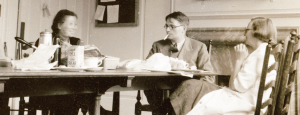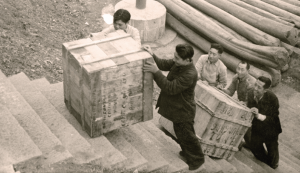FRIDAY, 27 APRIL 2012
In 1952 Joseph Needham, along with a team of five other internationally respected scientists, was commissioned by the World Peace Council to investigate the allegation that the US was using biological weapons in China and Korea. Whilst the majority of the Western world put it down to nothing more than Chinese whispers, the commission gathered evidence from doctors and local citizens as well as American prisoners of war. Its final report concluded that the American military were indeed experimenting with biological weapons, although the US continues to deny this. In peace time, as in war, the relationship between the Eastern and Western worlds came to consume Needham’s work and he is now widely regarded as the greatest sinologist to be spawned from the West.After a somewhat turbulent childhood, Needham secured a place to study Chemistry at the University of Cambridge. When he arrived at Gonville and Caius College in 1918 he intended to follow his father into the medical profession. However, under the guidance of Frederick Hopkins, he became ensnared by the chemistry of biological processes. The recruitment of Needham and other promising young scientists was part of Hopkins’s attempt to establish biochemistry as a field distinct from either medical physiology or organic chemistry. In 1924 the Dunn Institute of Biochemistry (now renamed after Hopkins) was opened, and Biochemistry became its own department with Hopkins at the helm. In the same year, Needham married fellow biochemist Dorothy Moyle, now acclaimed for her work on muscle contraction. Needham focussed on embryo development, searching for the chemical agents that enable a single cell to develop into a complex and differentiated organism. Needham was so interested in the field that he wrote a million word survey, entitled Chemical Embryology, detailing its historical and latest findings.
Cambridge’s scientific community nurtured much more than Needham’s academic development, it also provided him with political allies. In the context of straining international tensions, the Cambridge Anti-War Council was set up. An adamant pacifist, Needham took the chair for its first public meeting in 1932, in the company of physical scientist and socialist JD Bernal and chemist Dorothy Hodgkin. The council organised a demonstration on Armistice Day in 1933 to protest against the militarisation of research and in favour of peace. The demonstrators soon found themselves the targets of projectile attack, after being ambushed by the Cambridge University Conservative Association. As they continued along their planned route towards the town war memorial, the remnants of eggs and rotten tomatoes seeped into their clothing. The Evening Standard reported the day’s events under the headline ‘Hooligans in Cambridge’, but the protesters were surprised to read that the headline was intended to describe them rather than their Conservative opponents.
In 1937, with a return to war looking ever more likely, the Cambridge Department of Biochemistry prepared to welcome three new visitors from abroad, the Chinese scientists Lu Gwei-djen, Wang Ying-lai and Chen Shi-zhang. Lu became Needham’s assistant, and he developed a strong attachment to her and her interest in the history of Chinese civilization. In 1942, Needham jumped at the chance to visit Lu’s homeland when he was tasked by the British Council to establish a Sino-British Scientific Cooperation Bureau in Chongqing; this aimed to facilitate the provision of scientific equipment and literature to universities and laboratories across Western China. Needham spent four years in China, practising the language that Lu had taught him, and was always keen to discuss the history of Chinese science.
On returning to Cambridge, Needham resolved to continue delving into China’s scientific past. He discovered evidence of historically neglected advancements; the Chinese were the first to have knowledge of magnetic polarity, the earliest to manufacture cast iron, and should have been credited with the discovery of gunpowder. Needham began work on an extensive record of his findings. The first volume of Science and Civilisation in China was published in 1954 and a further seventeen had been added by the time Needham died in 1995 at the age of 94. Work on the project continues today, based at the Needham Research Institute in Cambridge.
One issue troubled Needham particularly—why, after achieving so much in ancient times, did scientific advancement fizzle out in China while in Europe it began to accelerate, laying what we identify as the foundations of ‘modern science’? This has become known as Needham’s Grand Question.
In developing a grand answer, Needham emphasised the impact of Confucianism and Taoism on the pace of Chinese scientific discovery, and contrasted what he called the Chinese ‘diffusionist’ approach with the ‘inventive’ approach favoured in the West. Scientific progress did continue in China, but simply could not keep up with the exponential growth of scientism sparked by the European Renaissance. However, it seems that the tables are on the verge of turning once more as China is rapidly becoming a scientific powerhouse; while scientific activity in many nations stagnates, China’s share in scientific publishing has more than doubled over the past decade, now second only to the USA. The rich tradition of Chinese science highlighted by Needham looks set to continue.
A polymath academically, Needham’s personal life also reveals his multifaceted identity. He sustained a lifelong attachment to religion, attending church in the Essex town of Thaxted, where the revolutionary socialist priest Conrad Noel presided, though Needham converted late in life to Daoism. He was also a keen Morris dancer and joined the Cambridge Morris Men soon after arriving at University—he was reportedly a skilled performer, light on his feet and a renowned accordionist.
Known throughout China as Li Yuese, Needham was a truly remarkable person and his achievements are many and varied. He was Master of Gonville and Caius from 1966 to 1976, bestowed the title of Companion of Honour, and elected a fellow both to the Royal Society and the British Academy. However, his lasting legacy will be his work in the field of the history of science; Needham’s love of China started with an attempt to bring knowledge of Western science to the East, but ultimately inspired him to bring knowledge of Eastern science to the West.
Helen Gaffney is a 3rd year undergraduate in the Department of History and Philosophy of Science


